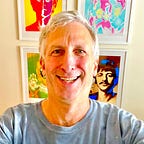THE GREATEST SONGS OF THE 1960s THAT NO ONE HAS EVER HEARD
Zoot Money & the Big Roll Band — Larger Than Life British R&B Legend Gives the Police’s Andy Summers His Start
Zoot Money’s Big Roll Band — “Big Time Operator”
Zoot Money was “quite simply the biggest character on the British rhythm and blues scene since the early 1960s”, but this 45 was his only one to hit the money (#25 in the UK).
It is a joyous R&B/jazz powerhouse, “custom-composed . . . by the team of Tony Colton and Ray Smith”.
Let’s listen to Zoot’s website:
B]oth his parents were Italian immigrants, although his father’s family (really called Money) were originally English. . . . In 1961 Zoot formed the first incarnation of the Big Roll band . . . . Before long [it] alongside those other luminaries of the Soho blues scene of the time, Georgie Fame & The Blue Flames and The Animals, had become permanent fixtures at the Flamingo Club . . . the epicentre of the Swinging Sixties. Zoot’s shows were famed far and wide for his combination of outrageous antics (including ‘shocking’ trouser activity . . . ) tight musicianship and passionate vocal delivery. . . . In the late 1960s, after scoring a hit with ‘Big Time Operator’, the Big Roll Band metamorphosed for a while into the prototype psychedelia outfit Dantalian’s Chariot. Sharing bills with the likes of Pink Floyd . . . Soft Machine and The Crazy World of Arthur Brown, there were a lot of goings-on with white khaftans, lava lamps and sweet-smelling incense at the most underground of clubs . . . .
Bruce Eder adds that:
Zoot Money was one of British rock & roll’s homebound heroes — admired, respected, and sought after by his colleagues, and able to fill halls in England nightly, he never managed to sell lots of records, even in England. . . . During the mid-’50s, he discovered rhythm & blues and its younger offshoot, rock & roll, which quickly consumed his interest in music — he switched to the keyboard under the inspiration of Jerry Lee Lewis and Ray Charles, and by the beginning of the ’60s was developing a distinctive technique on the Hammond organ. He’d also picked up the nickname by which he’d be known for most of his career after attending a concert by Zoot Sims. . . . He passed through the lineups of a few groups as a keyboard player . . . . [Then] classic version of the Big Roll Band . . . . took root in London, consisting of Money on vocals, piano, and organ, [and including] Andy Somers [yes, the Police’s Andy Summers] on guitar . . . . They quickly became a popular attraction on London’s burgeoning R&B and jazz scene, partly owing to Money’s impassioned interpretations of American R&B standards and his wild sense of showmanship, coupled with the band’s overall excellence . . . . They were good enough to attract the attention of England’s Decca Records . . . . [and by] the following year, they’d moved over to EMI’s Columbia Records imprint . . . . [An album was released, but] neither it nor the accompanying 45s captured the excitement or appeal that the group or its leader exhibited on-stage. . . . [By] late 1966. . . . the audience for American-style R&B and soul was already giving way to a growing listenership for psychedelic sounds, and the name “Big Roll Band” sounded like something just a little bit too far from the wafts of incense . . . . [I]n 1967, they transmuted, almost Doctor Who-style, into Dantalion’s Chariot. . . .
See my website at bracefortheobscure60srock.com.
Here they are live:
Here is a killer version by Aussies ID with Jeff St. John:
Here are Tommy James and the Shondells:
